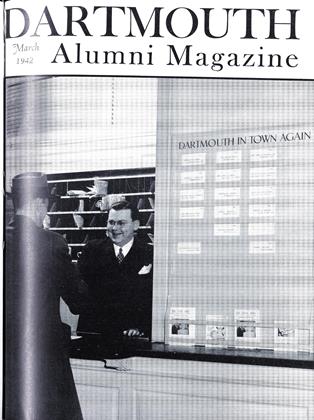THE GROWING NUMBER OF Dartmouth students turning to handicrafts in their spare time has some direct relation to the war and its accompanying mental conflict, it is believed by Virgil Poling, director of the college's Student Workshop, who recently reported on the first year of Dartmouth's extra-curriculum experiment "to teach men to use their hands as well as their heads."
The increased desire for manual tasks is the natural outgrowth of a period of tension and confusion, Mr. Poling reported. "A workshop has its greatest value in a time such as the present," he stated, "and it would be contribution to morale and mental balance if every Army and Navy post, as well as every school and college, provided the tools and materials to gratify the desire to work with one's hands. This is the type of activity which steadies nerves and helps one make sound decisions. Perhaps in the future the need of it will be so general and so well understood that instruction and tools will be made as readily available as books."
The figures in Mr. Poling's summary of a highly successful year indicate that the war is but an incidental cause for the increased hum of activity in the Dartmouth workshop. From an original group of about 75 men working on various projects the list of students actively practicing a dozen different handicrafts has grown to 225 during the year. If to this figure is added the number of different men who drop in for odd jobs, such as repairing skis, the total reaches 600, slightly more than one-fourth of the undergraduate enrollment of the college.
The Student Workshop at Dartmouth has been forced to expand its quarters since it first moved into the drafting rooms of the old Thayer School of Engineering, and a large adjoining room now takes care of the boat-builders who threatened to crowd everyone else out of the shop. The assortment of power tools, hand tools and materials has become increasingly complete.
The program directed by Mr. Poling includes all forms of woodworking and cabinet work, metal work, leather work, workshop planning, workshop safety, the use and care of tools, and special training for students who work as camp councilors in the summer. As soon as more fireproof quarters can be found for the shop, a kiln will be added for plastics, pottery and enameling and a forge will be set up for metal forging.
One of the fruitful results reported by Mr. Poling is the number of father-and-son workshops started at home as a result of the Dartmouth program. Many hobbies holding the promise of lifelong satisfaction have been started, and a number of students have discovered skills which they never thought they had. Mr. Poling sticks to his educational approach, insisting that his object is to teach the student and not the trade; but even so, two of his boys got jobs in an airplane factory last summer and another became a temporary carpenter's helper.
 View Full Issue
View Full Issue
More From This Issue
-
 Article
ArticleTrials, Tribulations, Success
March 1942 By RALPH SANBORN '17 -
 Sports
SportsBig Green Teams
March 1942 -
 Class Notes
Class Notes1917*
March 1942 By EUGENE D. TOWLER -
 Class Notes
Class Notes1937*
March 1942 By DONALD C. MCKINLAY -
 Article
ArticleIndians Scout for the Fleet
March 1942 By LT. E. F. PLANK, UNITED STATES NAVAL RESERVE -
 Class Notes
Class Notes1931*
March 1942 By CHARLES S. MCALLISTER








